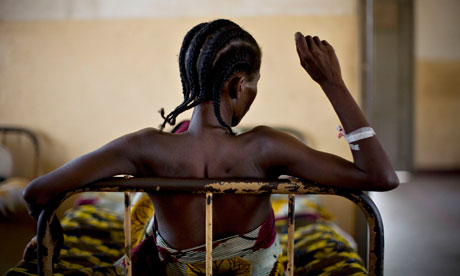About 100 women attacked in villages near Fizi in Democratic Republic of Congo, according to Médecins sans Frontières

At least 60 women were raped and dozens of other people beaten by suspected rebels during a two-day attack on a pair of villages in eastern Democratic Republic of Congo earlier this month, according to an aid agency and local officials.
The mass rape occurred in Abala and Nyakiele, near the town of Fizi in South Kivu province, during 10-12 June , Médecins sans Frontières said on Thursday.
MSF sent a team to the area this week after hearing reports of sexual violence in the villages, which are in a relatively remote area with no mobile phone coverage.
"We have seen at this point over 100 cases of people who reported being raped or suffering other incidents of physical trauma," said Megan Hunter, head of the MSF mission in South Kivu, speaking by phone from Congo.
The attacks have been blamed on a group of up to 200 former rebels who had been integrated in the Congolese army before deserting earlier this month, the UN-backed Radio Okapi said.
In February, nine soldiers from the same army unit were convicted of raping more than 60 women in Fizi on New Year's Day.
A provincial parliamentarian, Jean Marie Ngoma, told Radio Okapi that at least 60 women had been raped in the latest attack, a figure Hunter said "was not an exaggeration" based on her team's observations.
Ngoma alleged that the raid was committed by former fighters from the Pareco rebel group, under the command of Colonel Kifaru Niragiye, all of whom deserted the Congolese army earlier this month in protest against changes in the local military command.
"These men looted health centres, phones, goats, property of the population and also forced some people to carry their luggage," Ngoma said.
"But the worst case is that of mass rapes they have committed in Nyakiele. The information I have from reliable sources speaks of more than 60 women raped by the troops. People are in total despair."
Kifaru was the commander of the local military sector when the New Year's Day rapes occurred in Fizi.
His deputy, Lieutenant-Colonel Kibibi Mutware, was found guilty of crimes against humanity related to the attack and sentenced to 20 years in jail.
The UN peacekeeping mission, Monusco, said it was investigating the reports of the latest mass rape. Peacekeepers and representatives of several aid agencies are expected to visit the affected villages on Friday.
The eastern part of Congo, which has suffered from war and instability since the early 1990s, has an extremely high incidence of sexual violence.
http://www.guardian.co.uk/world/2011/jun/23/democratic-republic-congo-gang-rape
VILLAGES
More than two dozen children were among the hundreds raped by armed rebels in the war-torn eastern Democratic Republic of Congo, the United Nations said.
Twenty-seven minors, including one boy, were among the victims, the U.N. said Friday. One attempted rape was also reported.
The children were among 240 people raped by Rwandan and Congolese rebels who raided villages in North Kivu province between July 30 and August 3, aid groups said. Attackers blocked roads and prevented villagers from reaching outside communications. Many homes were also looted.![]()
MONUSCO, the United Nations peacekeeping force in the country, raised the number of victims after earlier reports put it at 156.
Since the rapes were first publicly reported on August 22, more victims have come forward, the force said.
The United Nations has said it did not learn about the attacks until August 12, when it was alerted by International Medical Corps.
International Medical Corps said it first told the United Nations about the rapes on August 6.
A July 30 internal U.N. e-mail that was relayed to relief agencies working in the area warned that the rebels had taken over the villages, and had already committed one instance of rape.
The town of Mpofi, 52 kilometers from Walikale, had just fallen into the hands of the Democratic Forces for the Liberation of Rwanda, a rebel group.
"A woman was raped there," the e-mail said in French. "Humanitarian workers are said not to go there."
On August 10, the United Nations posted an online bulletin saying that 25 women had been raped in the villages, contradicting statements made by U.N. military spokesman Madnoje Mounoubai and special representative Roger Meece.
Asked to explain the discrepancy, deputy U.N. spokesman Farhan Haq told reporters this week: "We are aware of the existence of a number of e-mails and we are trying to trace exactly how those e-mails were responded to."
He said that about 80 peacekeepers were conducting patrols in an area about four times the size of Manhattan.
"The question is -- how much area could they cover, and were they able to get into the areas where they needed to be, where the relevant information was?"
U.N. officials have said they will toughen efforts to stop rapes in the region.
"The recent mass rapes underscores the need for an end to impunity for perpetrators of such crimes," said Margot Wallstrom, a U.N. special representative for sexual violence in conflict.
These attacks reinforce that "you cannot have a policy of zero tolerance backed by zero consequences," she said.

No comments:
Post a Comment